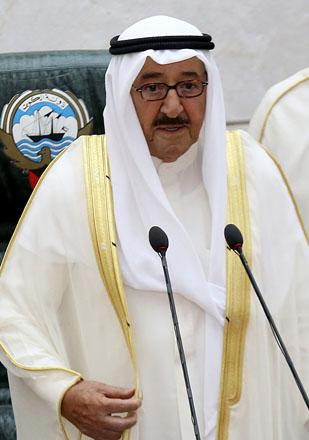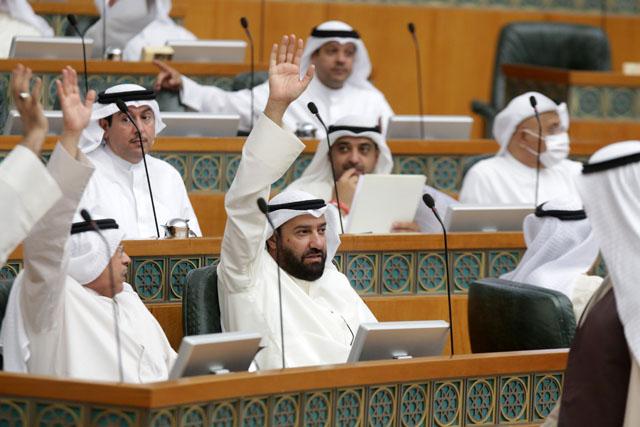You are here
Kuwait warns deficit 'inevitable' as spending soars
By AFP - May 26,2014 - Last updated at May 26,2014
KUWAIT CITY — Kuwait's finance minister has warned that the oil-rich Gulf state will face a certain budget deficit because growth in spending has outpaced a rise in public revenues.
"A budget deficit is inevitable... as the average annual growth in public spending was 20.4 per cent during the past decade against a 16.2 per cent average rise in revenues," mostly from oil, Anas Al Saleh told a recent special debate in parliament on government policy to diversify income sources.
"This is not only the view of the government but also that of the International Monetary Fund [IMF], the World Bank and other institutions," the minister said.
According to Finance Ministry Undersecretary Khalifa Hamada, spending had soared mainly because of a sharp rise in public wages and subsidies on services and commodities. Dependence on oil income also increased.
Between 2005 and 2013, government wages increased from $11.4 billion (8.3 billion euros) to $33.8 billion, a massive 25 per cent annually on average, he pointed out.
Subsidies also rose more than fourfold, from $4.1 billion to $18 billion during the same period, an annual growth rate of 23 per cent, Hamada indicated.
At the same time, oil income share in public revenues grew from just 85 per cent in 2001 to as high as 95 per cent in 2013, boosting Kuwait's heavy dependence on oil, the official said.
Oil income rose from $45.9 billion in 2005 to $106 billion last year.
Hamada added that if oil prices remain at the level of around $100 a barrel, Kuwait will post its first budget deficit estimated at $2.3 billion in 2017/2018 fiscal year. By 2035, the country is estimated to accumulate deficits worth as high as $633 billion.
The scenario will be much worse if the oil price drops, he remarked.
Hamada insisted it was impossible for the state to sustain growth in wages and continue subsidies, urging major cuts.
Earlier this month, the IMF warned Kuwait to contain a rapid rise in public wages and subsidies to safeguard the economy against oil price shocks.
The IMF said general subsidies, particularly on electricity and fuel, constitute a massive 7 per cent of the gross domestic product (GDP) and as high as a quarter of spending, which was around $70 billion last fiscal year.
Kuwait has boasted a budget surplus in each of the past 14 fiscal years, helping to increase its sovereign wealth fund to over $500 billion, local media said.
Separately, Kuwait will supply Egypt with 85,000 barrels of oil daily and 1.5 million tonnes of fuel for three years as part of a newly agreed commercial deal.
The supplies would be valued at market prices and delivered by the end of 2016 under the agreement struck this month, said Kuwait Petroleum Corp. marketing chief Ibrahim Al Mudhaf.
"The agreement is commercial and not political," Mudhaf was quoted as saying by the official KUNA news agency.
The deal would raise Kuwait's exports to Egypt to 85,000 barrels per day (bpd) from 65,000 previously, and to 1.5 million tonnes of diesel and aviation fuel annually from 860,000, he indicated.
The two sides were also discussing two other contracts for Kuwait to supply cooking gas and fuel oil to Egypt, Mudhaf added, noting that the agreements could be finalised within two months.
Cairo and Kuwait City were also discussing a number of oil-related investment opportunities, he remarked.
Following the ouster of president Mohammed Morsi in July, Kuwait offered Cairo an aid package worth $4 billion.
The package included a grant of $1 billion, a deposit of $2 billion at Egypt's central bank, in addition to oil and oil products worth $1 billion.
Related Articles
Energy subsidies are draining Kuwait's public budget, the Gulf state's finance minister said on Wednesday, as the government carries out a spending review to help avoid a budget deficit as early as this decade.
KUWAIT CITY — Kuwait's ruler called Tuesday on officials in the oil-rich state to seek alternative revenue sources and reduce public expendi
The Kuwaiti government has decided in principle to end subsidies on diesel fuel but will deal with any negative impacts on consumers before implementing the decision, the Cabinet said.

















